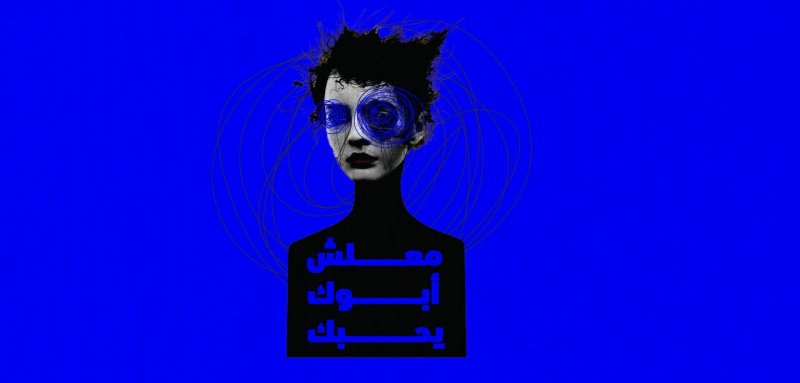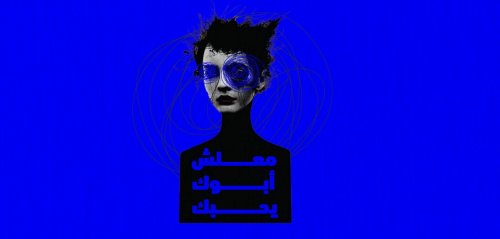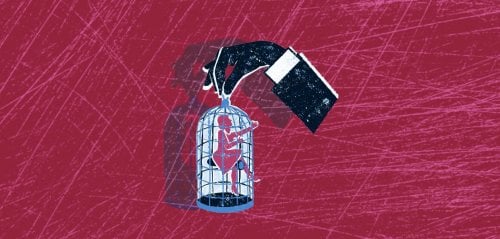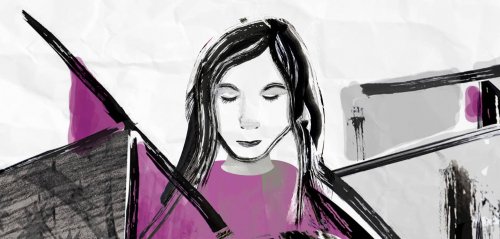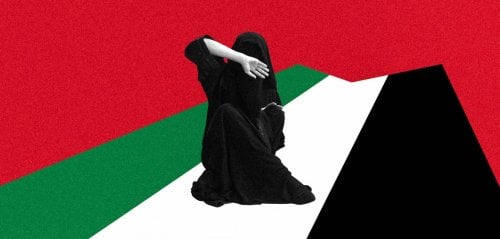Perhaps a friend's question about women's rights may uncover plenty of divisons and contradictions in the minds of the women and girls of the Gaza Strip, when she asked: 'Can I be a Muslim and call for women's rights at the same time?'
The question made me pause, even though it may seem funny when we think about it from the perspective of the general desire of religious communities to involve religion in everything, the inability to act without religious advice or the fatwa of the sheikh, that is, the inability to find a free moral framework that regulates daily life, and putting religion as a sort of obstacle to practicing normal civil life, whereas the basis of religion is actually the "revival of the soul", and not the restriction and subjugation that are often exploited by obscurantist religious regimes.
As for the question regarding the relationship between feminism, religion, and society, it doesn't need an answer as much as it needs taking a long pause with oneself, because it results from a question that exists on a daily basis in the minds of Muslim women in general, which is: Does feminism require that I be taken away from my religion and customs, my community and my family, in order to realize my freedom as a human being?
Based on the work of women's protection institutions in the Gaza Strip, and meeting some of the women working in those institutions, it becomes clear that these institutions — which are divided into those that are governmental and those that are non-governmental — operate with clear timidness and without the slightest ability to bypass the restrictions of society, its religious customs and beliefs, and its tribal and clan systems. This means that these institutions address the issue and try to treat it using the same methods that led to the problem itself!
Who runs women's protection institutions in the Gaza Strip?
Women protection institutions in the Gaza Strip are distributed, according to the directory of institutions working in combating violence against Palestinian women, between governmental and non-governmental institutions. The directory explained that the women's police force of the Ministry of Interior in Gaza is the first and the mother institution of all women's protection institutions. This raises many question marks on the actual general management of institutions and centers for the protection of women, as the Ministry of Interior in the Gaza Strip works to control internal security according to the perceptions and visions of the Islamic resistance government, and naturally, will not have any actual agendas to assert women rights except in accordance with the authoritarian patriarchal vision followed by all the ideologies of political Islam, which is alligned with the patriarchal and clan system that views women in a regressive light, and where the maximum rights a women can get is being able to have a job somewhere. As for the right to self-determination and individuality, the right to choose and express one's opinion, and the right to independence, these are all rights that the patriarchal authority views as an external intellectual invasion aimed at plunging Gazan society into the clutches of infidelity, atheism, and sometimes the association with Israel under the title of treason and espionage. It is worth noting that this patriarchal authority represents the ideological and social base of all systems of governance and administration in the Gaza Strip, including the Ministry of the Interior, from which the women's police sector branches from, and was the first haven for women's rights in the Gaza Strip.
These institutions operate with clear timidness and without the ability to bypass society's restrictions, religious customs, and tribal and clan systems, meaning that these institutions address the problem with the same methods that led to the problem itself!
As for other governmental institutions for the protection of women, such as the Aman Centre (Safe Home) of the Ministry of Social Affairs and the Ministry of Women’s Affairs, they operate within a framework constrained by strict religious customs, traditions, and legislation. This means that they do not depart from the general framework of the structure of the Gazan society that is subject to strict religious intellectual control, which is evident in the general appearance of the women in the Gaza Strip, and the complete rejection of any woman who appears without a veil, jilbab, or abaya, along with denouncing such a scene as a deviation from societal values. It is also worth noting that women's protection (female) workers themselves do not dare to impose themselves and their own personalities in terms of appearance, thoughts, and vision.
Under the same framework of religious rule in the Gaza Strip, which is dominated by Islamic resistance factions that form the structures of the government in Gaza in the absence of the Palestinian Authority from the scene, private non-govermental institutions operate to protect women, such as: the Gaza Community Mental Health Program (GCMHP), which in turn transfers any cases it receives to other protection institutions, as well as the Palestinian Center for Human Rights (PCHR), the AISHA Association for Women and Child Protection (AISHA), and the Center for Women's Legal Research and Consulting (CWLRC), which works directly with the community police in order to solve the cases it receives. Several other private institutions and centers also include the protection of women within their work, but the problem remains that all of these institutions operate under the umbrella of the authoritarian patriarchal system, thus unable to provide real protection for cases of abused women, who resort to protection institutions in order to obtain their freedom, and not only to stop the abuse.
"While my father was threatening to kill, torture, and imprison me, the head of the women's protection organization told me: 'Your father loves you and wants the best for you. Do not embarrass your grandfather and uncle. Go back to your family!" This story is only one of hundreds of stories that Gaza's women and daughters live on an almost daily basis, when they are subjected to violence, threats, and torture, and that may sometimes lead to murder. Then, clans, families, and local chiefs intervene and the whole thing is resolved in a session called "an Arab sit-down and a cup of coffee”!
As her voice trembled over the phone, F. S. told me that she wouldn't talk for too long, for fear of being caught by a family member making a suspicious phone call. She says, "I've always dreamed of being a guitarist, and sometimes I imagined myself at a rock and roll concert holding an electric guitar and shaking up the place with my music and singing."
The story began when F. S. went out and actually bought a guitar. As soon as she entered the house, her older brother smashed it to pieces before she could even take it out of its box, and addressed his father, saying, "Goodness, this is just what we needed! A whore in our house." In response, the father gave her several violent punches that ended up putting her in a coma.
This is one of hundreds of stories Gaza's women and daughters live on a daily basis while subjected to violence, threats, torture, and murder. Then clans, families, and local chiefs intervene to resolve the issue in just "an Arab sit-down and a cup of coffee”
The mother and other sisters would suffer the same fate if they tried to intervene, which prompted her to turn to a private women's protection institution, which greeted her with the words "May God guide you, dear girl, you brought a guitar to the house and you're a girl!"
F. S. couldn't hold it together any longer, and ended her conversation with me with a brief sentence, "While my father was threatening to kill, torture, and imprison me, the head of the women's protection organization told me: 'Your father loves you and wants the best for you. Do not embarrass your grandfather and uncle. Go back to your family!'
Perhaps this story is of a girl who is somewhat dreamy, that is, she lived in an environment that gave her little freedom to think, read, or listen to music in secret. But there are other stories of women and girls who were forbidden from even reading a book, going out to their relatives' homes, or thinking altogether!
Asmahan, for example, can only open her Twitter page when she is completely alone at home, which rarely happens. Following vigorous attempts to communicate with her, she tells us that she once reached out to a women's protection center, and they told her that she could go seek refuge with them for a while until they understood what is happening with her, and that they will provide the necessary assistance then. When she arrived at the center, she told them that her family prevents her from reading, going out, listening to music, or even sitting alone! The woman in charge of the center told her, "Okay, are you being subjected to any violence?" Asmahan was left dumbfounded, because everything she mentioned apparently is not classified as violence by women's protection institutions in the Gaza Strip.
The story began when F. S. bought a guitar. Her older brother immediately smashed it to pieces and said to his father, "This is just what we needed! A whore in our house." In response, the father gave her several violent punches that put her in a coma
Wissam al-Taweel unveiled the full truth and removed any doubts over the nature of the work of women's protection institutions in the Gaza Strip. Wissam, a female writer and poet from Rafah Governorate who has caused quite a stir in the Gazan public opinion a few months ago, revealed to us the state of identification and compatibility between the nature of the religiously strict Gazan society due to the culture of the ruling authority, and what is happening in the corridors of institutions and centers for the protection of women.
Wissam al-Taweel did not demand for anything more than her basic rights of individuality, independence, and the freedom to travel, only to be attacked by her father, family, society, and women's rights institutions themselves. An entire society rose up and revolted against a 21-year-old young lady who only said 'I want to travel to continue my studies abroad'.
Amidst her father's constant threats, and his claims that politically hostile parties had kidnapped her and persuaded her to rebel against him, along with many other delusions and fantasies, the human rights institution that Wissam and her sister resorted to pressured Wissam to give in to reality and abandon her dream, in exchange for guarantees that her father would undergo psychological treatment, and that he would no longer harm her, imprison her, and urge her to commit suicide. Indeed, Wissam and her sister Fatima were unable to face an entire society that was attacking them and belittling their ambitions, and was even sometimes calling them "whores". And in light of the failure of the human rights institution they resorted to assume its full responsibilities, Wissam was defeated, but through this defeat, she was able to achieve a great victory; she has revealed the nature of things and the way they work in these institutions that are supposed to be feminist. Wissam's account matched what the director of these institutions stated in a press interview regarding the case of Wissam al-Taweel, which is as follows:
- It is not the duty of these institutions to protect women in the Gaza Strip and to grant freedom to the survivors. The duty of the institution is to only stop the violence.
- The institution cuts off the survivors who enter its corridors from the outside world, for the psychological safety of the survivor.
- The institution does not force the survivor to stay even if her exit from the shelter endangers her life. As long as the survivor wishes to leave, it is her decision!
In this sense, the nature of the work of these institutions is closer to them being institutions of reform and reconciliation, and not women's protection institutions, and this is the work of clans and local chiefs, who, of course, can, under the auspices of the Ministry of Interior, interfere in any issue concerning survivors. As for the fact that institutions are cutting off survivors and separating them from communicating with the outside, this is considered a dangerous matter, since this would basically make the survivor detained inside the shelter until a solution can be reached with her family, instead of a solution to her case. What's normal is for the survivor to be aware of what is happening outside in order to make her decision based on knowledge and being aware of what is happening.
The last point, which concerns Wissam's case in particular, is that Wissam was not just an abused young lady or survivor looking for a life free of violence with the least rights. She has a dream, and a vision about a life she would like to live in her own way. But the women's protection institution has ruined her hopes of obtaining real protection. Not only that, but also it has, alongside the community police and in the presence of Wissam's family, mounted pressure on Wissam to return home! Inevitably, the decision to leave the protection center was not Wissam’s, but rather the decision of everyone else except Wissam, who until now we have not been able to contact after she was sent back home.
And since the decision for Wissam and her sister Fatima to return to their family's home was a decision that they did not participate in, but was rather imposed on them by the aforementioned parties (the family – society – human rights institutions and women’s protection institutions – the community police), Wissam had enough courage, steadfastness, and insistence to achieve her goals, which made her run away from home again, accompanied by Fatima, which indicates that the women's protection institution that Wissam resorted to tried to close an open case without resolving it, even if it had only set some conditions that the abusive father did not abide by at all. The father soon went back to controlling his daughters’ social media accounts, posting and speaking to people in their place. He forces them to comply with his orders, under constant threat, which has prompted them to run away once again. As for their uncle, who mediated the case the first time and took them out of the institution under his personal guarantees, was left out of the picture. The matter was left to the father, who in turn refused anyone's intervention concerning his daughters, even if that person is his own brother. All these events raise very big questions about the work of women's protection institutions in the Gaza Strip. Not all women in Gaza can escape for the second time, the way Wissam and Fatima did.
Now, Wissam and Fatima are sheltered again in a shelter affiliated with the protection institution that works in coordination with the community police in the Gaza Strip, after the authorities working in these institutions confirmed that the father is not in a stable mental state. He had previously pledged to undergo psychological treatment as one of the conditions to have his daughters return home, but he later refused and continued his threats, violence, and incomprehensible behavior, such as declaring that Edy Cohen, the Israeli journalist, was threatening him with kidnapping his daughters! These are delusional claims similar to hallucinations that seem to affect the man, such as the statement he posted on his Facebook page: “It seems that the girls are on their way to die under divine decrees,” a phrase that many saw as a clear threat that the father intends to kill Wissam and Fatima if they return home..
Until this moment, the case will remain raised and open until the father commits to not harm Wissam and Fatima again, along with allowing them to decide their own fate as each of them deems appropriate. This is a challenge to women's protection institutions in the Gaza Strip, which, as we have already mentioned, do not depart from the general context of the regressive situation in Gazan society. What will the decision of these institutions be when it comes to the lives of two girls who have been publicly threatened with death?
The world will devour you if you leave your rooms!
While the women of Gaza hope to find real feminist safety and protection within the walls of these women's protection institutions, or at the very least hope to find a different concept from the one that society imposes on women in Gaza with the concept, "The world will prey on you if you leave your rooms!", protection institutions reinforce that concept, in one way or another. This is because the nature of the work of these institutions under the umbrella and consent of this extremist society and the Ministry of Interior of the Islamic government in Gaza, requires them to submit to the religious patriarchal system, even if there are some individuals within those institutions who are outside the general framework of what is right and wrong in the sector, these individuals are inevitably unable to make a free and complete decision.
This intimidation of freedom has begun to dominate women who are dreamers, and you find them asking questions such as: Does feminism go against Islam? Will the world really prey on me if I leave my safe region?
The father posted: “It seems that the girls are on their way to die under divine decrees,” a phrase that many saw as a clear threat that the father intends to kill Wissam and Fatima if they return home..
We may wonder about what the authoritarian patriarchal society gains from the oppression and restriction of women and the diminishing of women’s protection institutions. The answer is that the life-hating and strict nature that describes the societies subject to religious control, is the reason for the oppression of women. After all, society itself does not gain anything from the oppression of women, other than more poverty, violence, regressiveness, and tension. This is the situation that the obscurantist religious authorities are working to create in order to justify their existence on the grounds that they came in order to achieve a moderate, balanced, and affluent life for the peoples. And when people submit to these powers in the hope of reaping the fruits of justice, balance, and prosperity, they reap nothing but more disaster, destruction, and oppression, not only on the level of women, but on the level of the state of society.
The incidents of violence and killing of women, and the general intimidation they experience in the Gaza Strip, have become an apparent matter that cannot be overlooked as an issue of public opinion. Moreover, as women's protection institutions base their work on timidness and take into account the feelings of a puritanical and strict society, women's freedom issues in Gaza become a difficult matter, as all the survivors who have resorted to protection institutions agree that they had hoped for a different fate, different treatment, and a real shelter not only for their bodies, but for their dreams, ambitions, and aspirations for a free and independent life, or a life that resembles them at the very least. Therefore, women's protection institutions in the Gaza Strip must take their responsibilities seriously, in order to break the stereotype that says that girls will be preyed upon by the world if they deviate from any context set by the patriarchal authority. These institutions must also work to liberate their frameworks and walls from the patriarchal religious authority first before starting feminist work and protecting women, otherwise we are just going around in a closed circle.
* The views and opinions expressed in this article are those of the author’s and do not necessarily reflect the official policy or position of Raseef22
Raseef22 is a not for profit entity. Our focus is on quality journalism. Every contribution to the NasRaseef membership goes directly towards journalism production. We stand independent, not accepting corporate sponsorships, sponsored content or political funding.
Support our mission to keep Raseef22 available to all readers by clicking here!
Interested in writing with us? Check our pitch process here!
